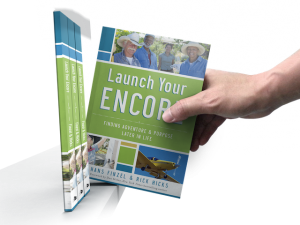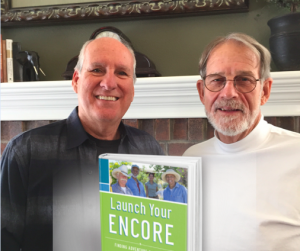This is the second in our series on my latest book Launch Your Encore, which I co-wrote with Dr. Rick Hicks. While the first episode covered some of the basic ground work on this topic, in this episode Rick and I are going to unpack the idea of having a vibrant life after your traditional career ends in greater detail.
Life Stage Development
Dr. Rick Hicks studied life stage development under Peter Drucker, which?mirrors society. Whereas at the beginning of the last century Dr. G. Stanley Hall recognized the stage of?adolescence between childhood and adulthood, today we are seeing a stage emerge that is after adulthood but really before old age when people are retiring from their traditional jobs to enter a new stage of mentoring, which we are calling “Elderlesence.”
Every stage of life features new skills to learn, such as learning to drive a car in young adulthood. Elderlesence is no different. It stems from a desire to not be marginalized by society after our careers come to an end.

People Get Ready
We work on getting ready for this stage our whole lives. A number of?sociologists have written about these various stages and figuring out what we need to learn in each stage in order to move on. The problem is most of these writers stop at the end of the career phase and do not cover this phase. Tribal people look at these stages a bit differently:
- Childhood: Under the direction of parents, learning right and wrong
- Apprenticeship: learning where you fit in society such as herdsman, tanner, etc.
- Journeyman: You have learned your trade, are living your life.
- Elder: You have ceased doing your work and are now giving advice to those learning the work, you are known for your wisdom.
- Old: The final stage where you just sit, are fed, and at some point just die.
I Can’t Get No Respect
Many Baby Boomers, especially in the US get a lot of flack for causing the world’s problems, such as the dwindling of Social Security. By contrast in other countries older people are revered and often cared for directly by their families, as opposed to going?into retirement or nursing homes.
One example of the way our society works is Jay Leno, who was forced out of the Tonight Show because he was 65. In an interview he said he accepted his being forced out and said he was looking for the next thing to do in his life.
Transition is unavoidable, featuring the end to some things and the beginnings of others. We are always in a state of transition, but in the Western?Culture we want to cut right to the change, rather than going through the process. In the seminal book on transition Dr. Bridges recognizes three stages of transition:
- Acknowledge the transition, starting with the end in mind. Recognize that things are not going to be the same as they were.
- Enter the “neutral zone” which is the period of change from one phase of life to another.
- This allows you to go on to the new beginning. Skipping one of these first two steps will short circuit the process.
Beware of the Dark Side
When people get to this stage, it is important to decide if you are going to stay positive, and not?get negative, thinking everyone owes you something. This attitude, along with staying active and around younger people that we can mentor, seems to be one of the keys to living longer, more productive lives.



